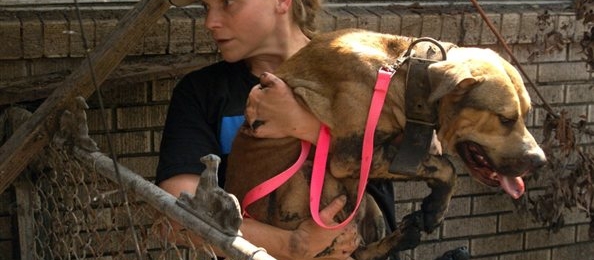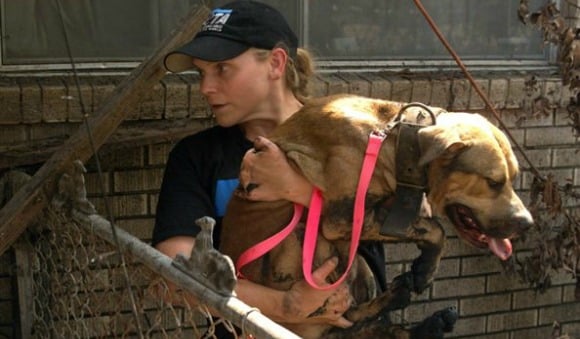The following tips will help you handle the most common animal emergencies, including those that arise during and after hurricanes and tsunamis.
1. The most important thing to do is to remain calm and not to leave the animal unattended. Please don’t assume that someone else will help. If you must leave the animal momentarily, ask a trustworthy person to stay while you are gone, and return as soon as possible.
2. Be prepared by making an animal emergency kit and keeping it in your car. Your kit should include the following items:
- Cat carrier (cardboard or plastic)
- Nylon leash
- Towel
- Pop-top can of smelly cat food and dog snacks
- Gauze bandage to stop bleeding or to use as a muzzle
- Contact information for the local humane society, a wildlife rescue or rehabilitation center, trusted veterinarians, and a 24-hour emergency veterinary office
3. If you spot a stray animal near a busy road, stop to help. Position your car between the animal and traffic, turn off the car, close the door quietly, and take your leash, cat food or treats, towel, and gauze with you in case the animal is injured. As you move toward the animal, remember the four rules of approach:
- Move slowly and quietly, and stay as low to the ground as you can.
- Avoid eye contact, which can be taken as a challenge. Keep your head down.
- Talk very softly to dogs and cats; be quiet around wildlife.
- Try to take with you on that first approach whatever you might need to use so that you won’t have to go back for something and approach a second time
4. If you are trying to apprehend a dog who runs away from you in fear, stop and kneel down or take small steps in the opposite direction as if you are walking away. Be patient—it might take awhile for the animal to muster the courage to come near. Coaxing the animal with food will help! Try to herd the dog toward a residential area, ideally into a fenced yard, where you can close the gate and prevent escape. Call the nearest animal shelter, animal control, or the police and ask for help. Be insistent.
5. If you find an animal who appears to be dead, gently touch the edge of the animal’s eye to check for an eye reflex. If the eye blinks, the animal is alive. Stop any bleeding by applying direct pressure with a clean towel or bandage. Then apply a bandage. Rush the animal to the nearest veterinarian, emergency animal clinic, or animal shelter.
6. Please stop to help if you find injured wildlife. Place the animal in a covered box or carrier and put the box in a dark, quiet place. Make sure that the animal doesn’t get too hot and can breathe inside the box. If the animal cannot be moved, cover him or her with a towel or blanket so that he or she will stay calm until help arrives. Again, make sure that the animal can breathe under the towel. Contact a local licensed wildlife rehabilitator or agency immediately.
Remember that it is not always fair to put a wild animal through the trauma of being handled by humans and the pain of surgery and recovery in an alien environment, especially when so many wild animals do not pull through in the end. Those who do pull through are often doomed either to live in a cage in captivity for the rest of their lives or to be released with a physical disadvantage as they attempt to fend for themselves again in the wild. Paying for euthanasia at the veterinary office or heading for an animal shelter is probably the best option. Stay with the animal to ensure immediate euthanasia. Few experiences can be more traumatic for wild animals than to find themselves trapped in a cage in a facility where they can smell and hear predators (dogs and cats) all around them.
7. If you end up with young, orphaned birds or mammals, make them comfortable just as you would if they were injured adult wild animals, as described above. But do not attempt to care for the animals yourself, and do not offer food or water! Please call your local wildlife rehabilitation center and transport the baby animals for care immediately.
8. Please take a moment to support PETA’s critical work for animals who are facing disaster or experiencing its aftermath. Your special gift will be a lifeline of support to animals who are suffering wherever there is an urgent need.
Text VEG to 73822 to get the latest vegan lifestyle tips, recipes, and urgent action alerts texted right to your phone.
Terms for automated texts/calls from PETA: https://peta.vg/txt. Text STOP to end, HELP for more info. Msg/data rates may apply. U.S. only.








